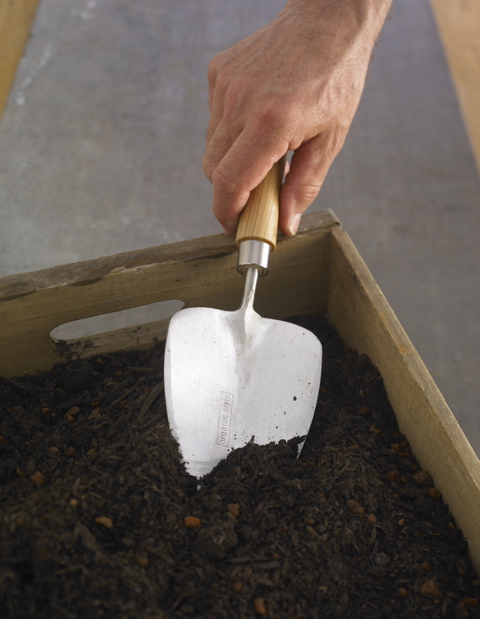

Recently, I had the pleasure of sitting in the front row of a class taught by Stephen Andrews, soil scientist and Professor of Environmental Earth Science at UC Berkeley. Also, known as the Dirt Dude, Soil Sommelier, Mulch Maestro and Compost Connoisseur, Andrews exudes wholehearted admiration, adoration and the utmost respect for the soil microbes eating and partying underground, like rockstars, while leaving behind essential nutrients for plants. Today the Dirt Dude is going to answer some questions on the foundation of your garden's soil. He'll make a soil worshiper out of you!
Why do you earth science geniuses get your knickers in a twist over dirt?
Let's go one thing straight, before we put a shovel in the ground. Dirt is the stuff that your nosy next door neighbor likes to dig up on you. Dirt is that stuff that has taken up residence in your carpet. Dirt is the stuff consumed haphazardly by your vacuum cleaner. Dirt is the stuff removed by your washing machine from your finest Smith & Hawken gardening apparel. Dirt is not, however, emphasis on NOT, a growth medium for plants. That is the domain of soil.
Okay, Soil Scientist, why does soil matter?
Well, for starters, it happens to be one of the most biologically productive ecosystems on planet Earth, the most neglected of our natural resources, and all too often taken for granted. Soil is what sustains life on our planet. Sure, air and water are important. No doubt. But how long do you suppose you would survive on a diet or air and water alone? Soil deserves our utmost R-E-S-P-E-C-T. Sing it to me Aretha! As a gardener, a measure of reverence wouldn't hurt. The birth and death of civilizations has centered on soil and its health. Soil is part of the heritage of humanity. One teaspoon of forest soil can contain 10 billion bacteria! Soil is alive! Soil, unlike dirt, is a treasure. It matters. And it should matter to everyone.
What should we do to look like good stewards of the earth (while we really just want to show-off our English roses blooming on the garden fence)?
The notion of having bad soil has more to do with us trying to reshape what occurred naturally via the process of soil formation. In short, there are really no bad soils, only soils that have had bad things done to them. Doing bad things to a soil includes the addition of unnecessary or unsuitable amendments, the use of excess agrichemicals (fertilizer, herbicides, pesticides), excessive tillage (aka rototilling), and compaction. Don't expect to have the Garden of Eden unless you've paid homage to your soil first! The mantra of home gardeners throughout Obamaland should be compost, compost, compost! Mulch, mulch, mulch!
After we get down on our knees, kiss the earth and pet a worm, then what?
Every gardener worth their green thumb knows the value of making compost at home. Home composting not only reduces the amount of waste ending up in a landfill, but also improves the quality of your soil, and saves you money. Your homemade compost will promote soil structure, help to maintain soil moisture, moderate soil temperature, improve soil tilth, balance your soil's pH level so that nutrients are released slowly to plants and provide a food source for soil organisms. I recommend that your readers call their local Master Gardener office, or better yet, sign-up for a home composting workshop. The bottom line is compost.
I also recommend a home garden test for new homeowners or twice a year in the fall and spring especially if your growing fruits and vegetables. Don't get the five dollar soil test. They're a waste of money. A good soil tester starts at about $20.00 I usually have my class use the "Soil Master" by the Mosser Lee company.
Top-dressing my yard in the fall and spring with a layer of compost makes the soil organisms bust-a-move underground and the flowers pirouette with joy. How about feeding potted plants?
I favor the use of compost as a true slow-release fertilizer and manure tea made from aged horse or cow manure for a nutrient punch when time is right. Critical to correctly applying fertilizers, organic or inorganic, is knowing when your plants need food. Consider this. Do we feed newborns steak? No. Plants, like humans, differ in their nutritional needs based on their developmental stages. Seedlings have different nutritional needs from sexually mature flowering plants. The needs of annuals differ from perennials. As a gardener, one must understand and know the different developmental stages of the plants in a landscape palette. Gardeners who insist on applying a 20-20-20 fertilizer every two weeks are wasting good green cash, and worse yet, are directly contributing to non-point source pollution by applying excess nitrates and phosphates in fertilizer that go unused by plants and leach away into our creeks and streams.
Now repeat after me, with feeling, "Compost, Compost, Compost!"
Come talk dirt and nerd it up with Annie at www.dirtdiva.com

